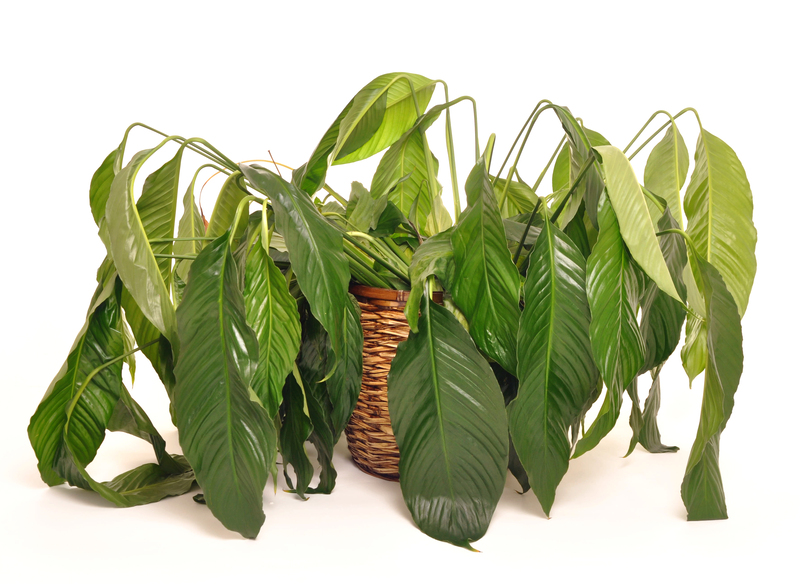Turning Scraps into Soil Power
Posted on 31/05/2025
Turning Scraps into Soil Power: The Ultimate Guide to Composting for Gardeners and Eco-Enthusiasts
Imagine transforming your everyday kitchen waste into something invaluable--rich, fertile soil that supercharges your garden's productivity. Welcome to the world of composting, where turning scraps into soil power is not just possible, but incredibly rewarding for you and the planet.
Why Turning Scraps into Soil Power Matters
Every year, millions of tons of food waste and yard clippings are sent to landfills, creating methane and contributing to global warming. However, by redirecting organic scraps from the trash bin to a compost system, you engage in one of the most impactful, accessible forms of recycling--boosting your soil's vitality while reducing your ecological footprint.
- Reduces landfill waste: Composting cuts down landfill contributions, lessening greenhouse gas emissions.
- Improves soil health: Compost enriches the earth, promoting robust plant growth with vital nutrients.
- Saves resources: Reducing the need for store-bought fertilizers and decreasing dependency on chemical inputs.
- Supports biodiversity: Healthy soils foster beneficial microbes and insects, sustaining ecosystem health.
Understanding the Science: How Composting Works
At its core, composting is the decomposition of organic matter by microorganisms, fungi, bacteria, and invertebrates like worms. When you turn kitchen scraps into garden power, you're essentially mimicking the natural process of decay that happens on a forest floor--but with a little more control.
Microbes break down carbon-rich and nitrogen-rich materials into humus, a nutrient-packed soil amendment. The resulting compost not only improves the structure, fertility, and moisture-retaining capacity of your soil, but also helps suppress plant diseases and pests.

The Essentials: What You Can and Can't Compost
Turning Food Scraps into Rich Compost
When creating powerful compost, remember this golden rule: you need a mix of "greens" (nitrogen-rich materials) and "browns" (carbon-rich materials).
- Greens: Vegetable peels, fruit scraps, coffee grounds, tea bags, grass clippings.
- Browns: Dried leaves, shredded newspaper, cardboard, sawdust, straw.
For optimal soil-enhancing compost:
- Maintain a ratio of about 2-3 parts browns to 1 part greens.
- Chop or shred materials for quicker breakdown.
- Keep the pile moist but not soggy, like a wrung-out sponge.
What Not to Compost
- Dairy products, meats, and oily foods (they attract pests and can smell).
- Pet waste (can harbor harmful pathogens).
- Diseased plants or invasive weeds (could spread problems to your garden).
- Glossy paper or plastics (they don't break down naturally).
Methods for Turning Kitchen and Yard Waste into Soil Power
1. Traditional Pile or Bin Composting
This is the classic method for turning scraps into soil power. Designate a spot in your backyard or use a compost bin. Layer your greens and browns, and turn the pile every 1-2 weeks to introduce oxygen and speed decomposition.
- Pros: Low cost, simple to start, handles large volumes.
- Cons: Takes space, may attract critters without proper care.
2. Vermicomposting - Harnessing Worm Power
Using red worms (e.g., Eisenia fetida), you can quickly convert kitchen scraps into soil power in a compact, odorless system--often indoors!
- Build or buy a worm bin.
- Add bedding--moist shredded newspaper or coir is ideal.
- Feed the worms your food scraps (avoid citrus, onions, and meats).
- Collect nutrient-dense worm castings after a few months.
3. Tumbler Composting
Compost tumblers allow you to easily turn your mix for faster aeration and decomposition. Perfect for small spaces or for gardeners who want a tidier system for converting scraps into gardening gold.
- Pros: Rodent-proof, neat, faster results.
- Cons: Limited in size.
Supercharging Your Soil: The Benefits of Home Compost
When you focus on turning household scraps into soil power, you unlock a suite of agricultural and environmental benefits:
- Soil Enrichment: Homemade compost teems with nutrients and beneficial organisms, improving plant health and yields.
- Water Retention: Compost increases soil's ability to hold moisture, helping plants endure drought.
- Pest & Disease Resistance: Healthy soil fosters resilient plants that can better ward off disease and pests.
- Sustainable Gardening: By recycling waste, you close the nutrient loop, reducing the need for synthetic fertilizers and their negative environmental impact.
Common Challenges and Solutions in Composting
Bad Odors?
Fix: Unpleasant smells often signal too many "greens" or a lack of oxygen. Add more browns and turn your pile frequently.
Too Wet or Too Dry?
Fix: Compost should feel damp but not sopping. If too wet, mix in dry browns. If too dry, add water or more greens.
Pests Invading the Compost?
Fix: Bury food scraps beneath browns, never add meat or dairy, and use a closed bin or tumbler in pest-prone areas.
How to Use Your Finished Compost for Maximum Soil Power
Your compost is ready when it's dark, crumbly, and earthy-smelling. Now, it's time to empower your soil:
- Top-dress: Spread 1-2 inches on garden beds and around trees and shrubs.
- Mulching: Apply a layer to retain moisture and suppress weeds.
- Potting Mix: Combine compost with garden soil for robust container plants.
- Compost Tea: Soak compost in water to make a nutrient-rich liquid fertilizer for your plants.
Boosting Soil Power in Urban and Small Spaces
Apartment Composting Tips
Without a yard? Urban dwellers can still enjoy the benefits of turning scraps into potent soil enhancer:
- Use a worm bin under your sink or on a balcony.
- Try Bokashi bins--which ferment scraps for later burying in soil or a park community garden.
- Seek out community composting initiatives or drop-off programs.
Innovative Ways to Turn Scraps into Soil Power
1. Bokashi: The Anaerobic Approach
Bokashi composting is a unique, airtight method using beneficial microbes to ferment food waste--including dairy and meats. It's fast and virtually odorless, making it ideal for households seeking more flexibility and speed in food waste to soil building.
2. Trench Composting
This no-fuss method involves burying scraps directly into garden soil. Microbes and worms then digest the material right where plants need nutrients. A perfect strategy to recycle kitchen waste into immediate soil energy.
3. Compost Tea Brewing
Soak finished compost in water to extract soluble nutrients for a powerful organic fertilizer. Compost tea provides a quick boost, especially for vegetables and container-grown plants.
Community Composting: Amplifying the Impact
Not everyone has the space or time for home composting, but that doesn't mean your scraps must go to waste. Many cities now offer community composting hubs, where collective food waste is transformed into soil-rejuvenating compost. Participating in these programs helps:
- Reduce city-wide landfill waste.
- Support local urban farms and green spaces.
- Educate neighbors and children about sustainable living.
Frequently Asked Questions About Composting and Soil Power
- How long does it take to turn scraps into soil power? - Depending on the method, it can take 2-12 months. Faster systems, like tumblers or worm bins, can yield compost in as little as 2-3 months.
- Is composting smelly or hard to manage? - With the right balance of greens and browns, composting should be mostly odor-free and easy to manage.
- Can I compost during winter? - Yes! Outdoor piles slow down in the cold, but they continue breaking down. Indoor bins or insulated composters can keep you composting year-round.

Inspiring Real-Life Stories: Scraps to Soil Success
Across the world, home gardeners, urban dwellers, and communities are discovering the satisfaction of turning what used to be garbage into pure garden gold. From balconies in bustling cities to sprawling rural farms, soil power is being regenerated one banana peel and coffee ground at a time.
Conclusion: Join the Soil Power Revolution
Whether you're a seasoned gardener or just starting your sustainability journey, turning scraps into powerful soil is one of the easiest and most impactful ways to enrich both your garden and the environment. Every potato peel, egg shell, or blade of grass collected is a step towards healthier soil, cleaner air, and a more resilient planet.
Ready to get started? Don't let your scraps go to waste--turn them into soil power and witness the transformation in your plants and your world.
Further Reading & Resources
Latest Posts
Easy and Cost-Effective Low Maintenance Solutions for Your Garden
Prepare Your Garden for Winter: Protecting Plants from Cold
Guide to Designing a Safe and Fun Garden for Children

